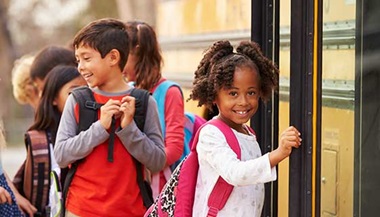How to Get Your Child Ready for the First Day of Kindergarten
Reviewed By:
Kindergarten is a major step for young children — their first day of “big kid” school. As exciting as this time may be for some, many kindergarteners struggle initially with the long days, challenging curriculum and time spent away from loved ones.
To get your student ready to learn, child psychologist Amie Bettencourt from the Division of Child and Adolescent Psychiatry offers helpful tips.

What can parents do to help prepare?
Establish strong routines at home.
Routines help children learn, make them feel safe and in control of their world, and foster their self-confidence and sense of belonging within the family. Some key family routines that will help children feel ready for kindergarten include:
Bedtime Routines
Bedtime routines ensure kids get a good night’s sleep and will be ready for the next day’s adventures. Some important parts of a bedtime routine include a consistent bedtime and a predictable order of activities (e.g., take a bath, put on pajamas, brush teeth, read favorite story or sing favorite song, get a goodnight hug or kiss from their caregiver).
Reading Routines
Parents are encouraged to read with their children for at least 20 minutes a day to build language and literacy skills. This reading routine can be part of the bedtime routine or at another time convenient for you and your child. A good way to make this time child-centered (and increase your child’s enjoyment and engagement in this time together) is by letting your child pick out the book.
Family Mealtime Routines
Having a family mealtime routine is not only an opportunity to teach your children about healthy eating habits, but is also a chance to spend quality time talking with your children, which builds their language and strengthens their relationship with you. You can also build in routines around mealtime that will be useful to your children in school, such as washing your hands before dinner or teaching them how to clear dishes from the table.
Stay up to date with vaccinations.
Take your child to the pediatrician for a checkup, and make sure all immunizations needed for kindergarten are up to date.
Tell your child what to expect.
Talk to your child about what kindergarten will be like to help them start preparing for this big transition. Children often have lots of questions about kindergarten, particularly if they are starting at a new school.
- Spend time talking with your child about what kindergarten will be like (e.g., who will be the teacher, what will the daily school routine look like, etc.).
- Involve him or her in picking out their school materials (e.g., backpack, clothes, etc.).
- You can also talk about what going to kindergarten was like for you as a way to model how your child can share feelings about kindergarten.
Once school begins, what are some conversation starters parents can use to get their child talking about school?
Ideally, talking with your child about school should be part of your family’s daily routine. Talking with your children not only gives you an opportunity to learn what they are doing in school and how they feel about school, but also provides an opportunity for you to communicate that school is important.
But getting conversations started with your young child about school is not always easy, as some children provide very little detail in response to the question, “How was school today?”
So here are a few other ways that you can get the conversation started with your children about school:
- Ask your children to tell you one new thing they did or learned about in school that day.
- Ask your children to tell you one thing they liked and one thing that was difficult about school that day.
- Ask your children about who they played with in school and what games they played.
- Create a family routine around talking about your day. For example, during mealtime or another time when you are spending time with your children, you can model how to talk about your day by sharing one or two things that you did that day and then asking your children to share one or two things about their day.
What specific aspects of kindergarten do new students struggle with?
Kindergarten is much more rigorous today than when most parents were growing up. In fact, children spend much more time engaged in structured reading and math activities than time spent in socialization and play-based learning. As a result, there is a mismatch between a child’s developmental stage and the academic skills he or she is required to master. Below are some of the issues that new kindergarteners may struggle with:
- A longer school day . Many children transition to kindergarten from half-day preschool programs, so spending a full day of school engaged in structured activities can be a difficult adjustment for them.
- Transitions . Transitioning from one activity to another is challenging for most young children, particularly when they have to stop a preferred activity (e.g., playing) to engage in something challenging (e.g., learning to read), and a typical kindergarten school day is full of these transitions.
- Sitting still and paying attention for long periods of time. The format of kindergarten has become much more structured and passive in nature, meaning young children are being required to sit still and pay attention to their teacher and to schoolwork for longer periods of time. This can be challenging for many kindergarteners who are still developing self-control and skills that help them sit still, focus and follow directions.
What are signs that a child isn’t adjusting well to kindergarten?
- The teacher reports that your child is having significant difficulty listening and following directions at school.
- Your child becomes verbally or physically aggressive toward peers or school staff.
- Your child has frequent temper tantrums at school.
- Your child expresses reluctance about getting ready for school in the morning. This may manifest as taking a long time to get ready in the morning, or saying things like “I don’t want to go to school” or “I don’t like school.”
- After a month or more of school, your child is still very tearful and clingy with you when you drop him or her off at school in the morning.
- Your child appears more sad, worried or irritable than before school started.
- Your child is having repeated daytime toileting accidents while at school.
At what point should parents consider seeking professional help?
- Your child is engaging in frequent disruptive behaviors at school (e.g., temper tantrums, verbal or physical aggression toward school staff or other children, destruction of classroom property, leaving the classroom without permission, etc.).
- Your child is frequently getting in trouble at school.
- Your child is displaying a lot of anxiety about school, which may take the form of expressed worries about teachers, peers or schoolwork and significant efforts to avoid going to school.
- Your child is more frequently tearful, sad or irritable and reports less interest in activities he or she typically enjoys since school started.
- Your child is having frequent toileting accidents at school despite being toilet trained for some time.







